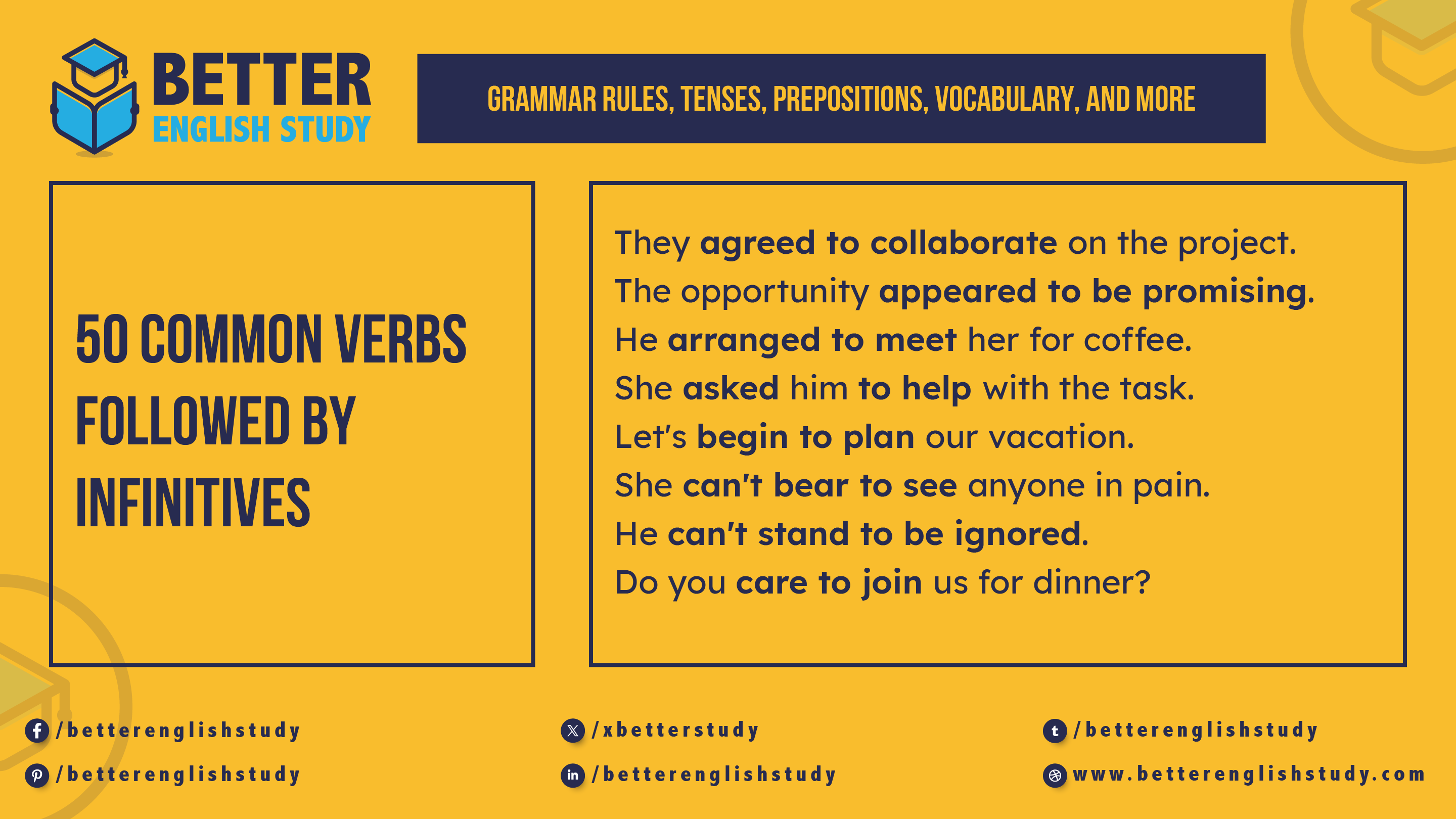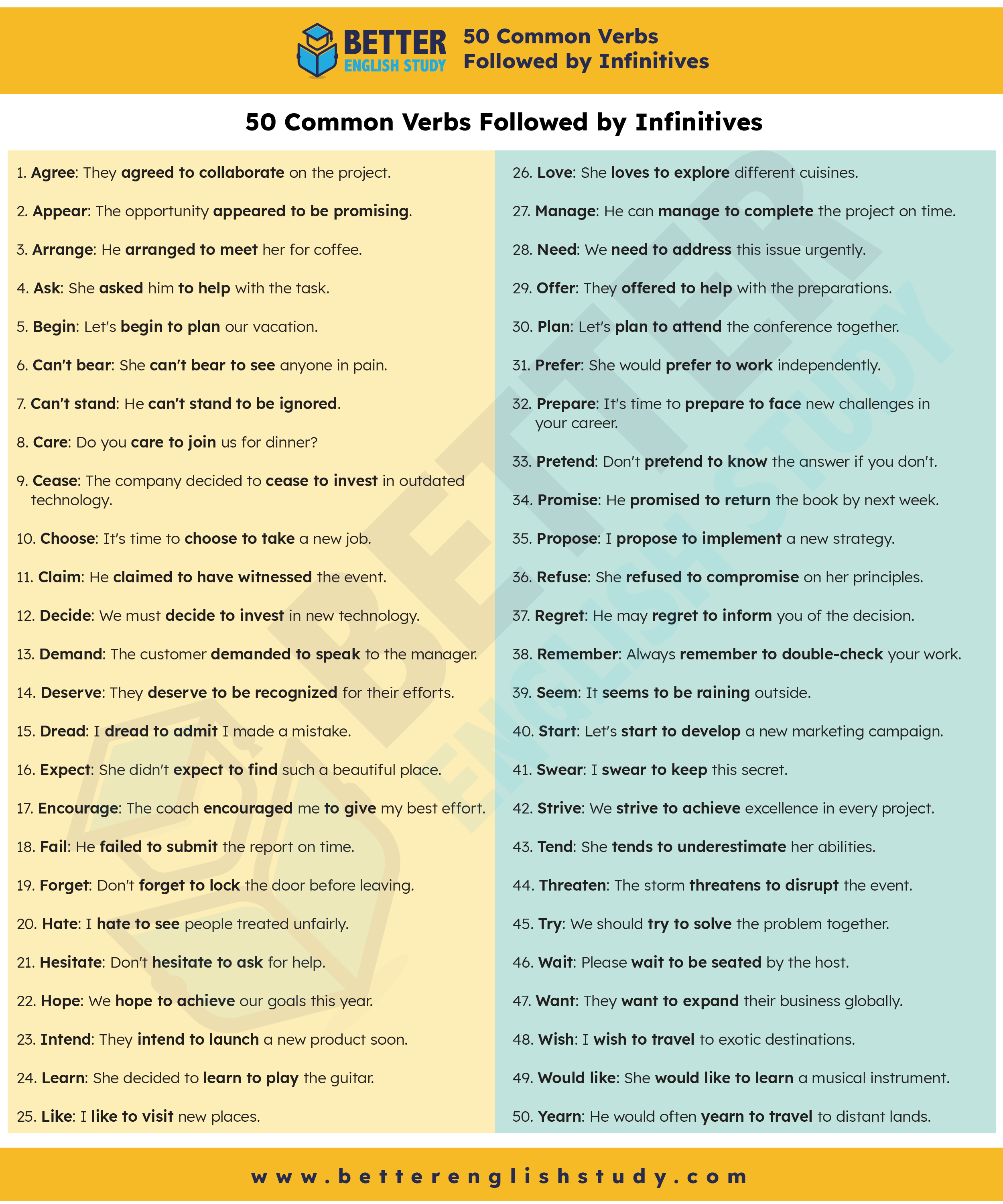
As English learners embark on the rewarding journey of mastering the language, understanding grammatical nuances is crucial. Among these nuances, pairing verbs with infinitives is a significant aspect of constructing meaningful and accurate sentences.
Imagine the determination to succeed or the willingness to learn; these instances showcase the use of infinitives in expressing purpose and intention.
In this article, we will delve into the world of infinitives, unraveling their essence and providing a comprehensive list of 50 common verbs frequently followed by infinitives.
What are Infinitives in English Grammar?
In English grammar, infinitives are the base form of a verb preceded by the word “to.” They are versatile, serving as nouns, adjectives, or adverbs within a sentence. The structure of an infinitive is consistent, characterized by the word “to” followed by the base form of the verb. For instance, in the sentence, “She decided to travel the world,” the infinitive “to travel” is the purpose behind her decision.
Infinitives bring clarity and precision to language, enabling speakers and writers to express intentions, desires, or actions with a distinct purpose. Whether used as a subject, object or complement in a sentence, infinitives provide flexibility and depth to the English language.
Now, let’s explore a list of 50 common verbs that seamlessly pair with infinitives, offering English learners a valuable resource to enhance their language proficiency.
- Agree: They agreed to collaborate on the project.
- Appear: The opportunity appeared to be promising.
- Arrange: He arranged to meet her for coffee.
- Ask: She asked him to help with the task.
- Begin: Let’s begin to plan our vacation.
- Can’t bear: She can’t bear to see anyone in pain.
- Can’t stand: He can’t stand to be ignored.
- Care: Do you care to join us for dinner?
- Cease: The company decided to cease to invest in outdated technology.
- Choose: It’s time to choose to take a new job.
- Claim: He claimed to have witnessed the event.
- Decide: We must decide to invest in new technology.
- Demand: The customer demanded to speak to the manager.
- Deserve: They deserve to be recognized for their efforts.
- Dread: I dread to admit I made a mistake.
- Expect: She didn’t expect to find such a beautiful place.
- Encourage: The coach encouraged me to give my best effort.
- Fail: He failed to submit the report on time.
- Forget: Don’t forget to lock the door before leaving.
- Hate: I hate to see people treated unfairly.
- Hesitate: Don’t hesitate to ask for help.
- Hope: We hope to achieve our goals this year.
- Intend: They intend to launch a new product soon.
- Learn: She decided to learn to play the guitar.
- Like: I like to visit new places.
- Love: She loves to explore different cuisines.
- Manage: He can manage to complete the project on time.
- Need: We need to address this issue urgently.
- Offer: They offered to help with the preparations.
- Plan: Let’s plan to attend the conference together.
- Prefer: She would prefer to work independently.
- Prepare: It’s time to prepare to face new challenges in your career.
- Pretend: Don’t pretend to know the answer if you don’t.
- Promise: He promised to return the book by next week.
- Propose: I propose to implement a new strategy.
- Refuse: She refused to compromise on her principles.
- Regret: He may regret to inform you of the decision.
- Remember: Always remember to double-check your work.
- Seem: It seems to be raining outside.
- Start: Let’s start to develop a new marketing campaign.
- Swear: I swear to keep this secret.
- Strive: We strive to achieve excellence in every project.
- Tend: She tends to underestimate her abilities.
- Threaten: The storm threatens to disrupt the event.
- Try: We should try to solve the problem together.
- Wait: Please wait to be seated by the host.
- Want: They want to expand their business globally.
- Wish: I wish to travel to exotic destinations.
- Would like: She would like to learn a musical instrument.
- Yearn: He would often yearn to travel to distant lands.

Understanding the dynamics of these common verbs followed by infinitives will enhance language proficiency, allowing learners to express intentions and actions with clarity and precision.
